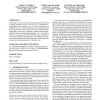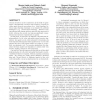129
Voted
ATAL
2009
Springer
15 years 9 months ago
2009
Springer
This paper presents a framework for describing the spatial distribution and the global frequency of agents who play the spatial prisoner’s dilemma with coalition formation. The ...
123
click to vote
ATAL
2009
Springer
15 years 9 months ago
2009
Springer
In planning as well as in other areas, temporal logic has been used to specify so-called temporally extended goals. Temporally extended goals refer to desirable sequences of state...
142
click to vote
ATAL
2009
Springer
15 years 9 months ago
2009
Springer
Predictable allocations of security resources such as police officers, canine units, or checkpoints are vulnerable to exploitation by attackers. Recent work has applied game-theo...
ATAL
2009
Springer
15 years 9 months ago
2009
Springer
122
Voted
ATAL
2009
Springer
15 years 9 months ago
2009
Springer
Whenever rational agents form coalitions to execute tasks, doing so via a decentralized negotiation process—while more robust and democratic—may lead to a loss of efficiency ...
142
Voted
ATAL
2009
Springer
2009
Springer
Effective solutions for real-world Stackelberg games: when agents must deal with human uncertainties
15 years 9 months ago
How do we build multiagent algorithms for agent interactions with human adversaries? Stackelberg games are natural models for many important applications that involve human intera...
120
Voted
ATAL
2009
Springer
15 years 9 months ago
2009
Springer
Current trends in model construction in the field of agentbased computational economics base behavior of agents on either game theoretic procedures (e.g. belief learning, fictit...
118
Voted
ATAL
2009
Springer
15 years 9 months ago
2009
Springer
Recent scaling up of decentralized partially observable Markov decision process (DEC-POMDP) solvers towards realistic applications is mainly due to approximate methods. Of this fa...
110
Voted
ATAL
2009
Springer
15 years 9 months ago
2009
Springer
Investigations of multi-robot systems often make implicit assumptions concerning the computational capabilities of the robots. Despite the lack of explicit attention to the comput...
80
Voted
ATAL
2009
Springer
15 years 9 months ago
2009
Springer



